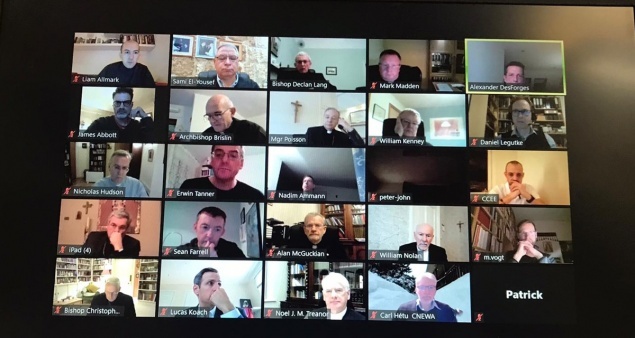HOLY LAND – From January 16- 21, 2021, the bishops of the Holy Land Coordination (HLC) held their virtual meeting with the local Church and Christians. This year, a particular attention was drawn to the effects of COVID-19 on the population of the Holy Land and the steps that were taken by the different solidarity and Christian institutions to combat and adapt to the reality that the virus created.
The first session was delivered by Mr. Sami El-Yousef, Chief Executive Officer of the Latin Patriarchate of Jerusalem. He spoke about the health, economical and spiritual situation of the Christian institutions in the Holy Land amid the COVID-19 pandemic and the effect of the high unemployment on the livelihoods of thousands of faithful. The financial problems faced by Latin Patriarchate schools and many other Catholic institutions were highlighted, and the possibility that some might be forced to close, was also a topic that was largely discussed.
Mr. Sami also reminded the bishops of the grave political challenges that are still facing the local population as a result of the Israeli occupation, at a time when the world is occupied with a life-threatening virus and news about normalization accords between Israel and the Arab countries. He reminded them that their continued solidarity and support is still needed to end the injustice and arrive at a durable and just peace. During the second day, briefings and analysis of the situation were given by His Beatitude Patriarch Pierbattista Pizzaballa and Archbishop Girelli, Nuncio to Israel and Apostolic Delegate to Palestine.
Another session was dedicated to the work and projects of the Latin Patriarchate parish and some Church institutions in the Gaza Strip; Thomas Aquinas Training Centre, Episcopal Diocese of Jerusalem’s run Ahli Arab Hospital, Caritas Jerusalem and the Catholic Relief Services.
In a video presentation, Fr. Gabriel Romanelli, Parish priest of the Holy Family, deplored the lack of prospects and possibilities for the youth in Gaza. The inability to leave the Strip is another problem that people face there. Unfortunately, COVID-19 has exacerbated the already adverse life of Palestinian Christians in Gaza, who for more than a year now have not been allowed to visit their families and friends in the West Bank and Jerusalem. In normal circumstances, the Church fights tooth and nail to obtain permits for Gazan Christians to celebrate Christmas and Easter in Bethlehem and Jerusalem.
Fr. Gabriel made a plea to the bishops to help preserve the Palestinian Christian presence that is dwindling daily, not only in Gaza but also in the West Bank: “It’s not an easy task! It’s our responsibility to do that but we need moral, spiritual and material help”. He also underscored the importance of job creation for the youth and the necessity to create housing projects for young families.
The bishops then listened to a presentation about the Thomas Aquinas Training Centre and received an update on the Job creation project for young people. In 2018, the Latin Patriarchate launched the job creation and capacity building program, which aimed to alleviate poverty and halt immigration from the Strip. The program benefited 45 young people to date, one of them is Elias Fashho, who was able to share his experience in this program with the HLC bishops, and how he managed to secure a job as an IT engineer at the Aisha Association for Women and Child Protection where he still works. This opportunity could not have come at a better time as Elias was laid off by UNRWA after it lost its funding from the United States in 2018.
Several presentations followed after. The Ahli Arab Hospital General Director talked about the health surge staff and internship program in response to COVID-19 as well as the generous support during the pandemic by Catholic Relief Services.
For its part, Caritas Jerusalem’s Gaza General Director presented the institution’s efforts to combat COVID-19. With the spread of the virus there, Caritas Jerusalem activated an emergency plan, prepared in March 2020 in coordination with the Ministry of Health, to provide medical services to COVID-19 patients in their homes as well as people who require other medical assistance. The plan entailed the activation of mobile medical teams who were alerted by call responders at the Ministry of Health to visit the nearest caller.
Caritas Jerusalem also coordinated the delivery of 2,500 Covid-19 diagnostic tests in June 2020, a donation by Pope Francis to the Health Ministry in Gaza.
The Head of Office for Catholic Relief Services in Gaza concluded the session with a presentation about the CRS partnership with the Sisters of the Missionaries of Charity, who work with disabled children and senior citizens at the Holy Family Parish compound.
The final day of the virtual meeting focused on the youth and the role of education in Christian Schools. It included presentations from directors, teachers and students from these schools. From the Latin Patriarchate Schools in Palestine, its Executive Director Mrs. Abeer Hanna, and Ms. Diana Basir, a teacher from the Al Ahliyyah College, explained the challenges and the solutions they reached to cope with the change in the teaching and learning process due to the COVID-19 pandemic. Two students were given the opportunity to talk about the pros and cons of distance learning during lockdowns.
By: Saher Kawas
Source: Latin Patriarchate of Jerusalem






